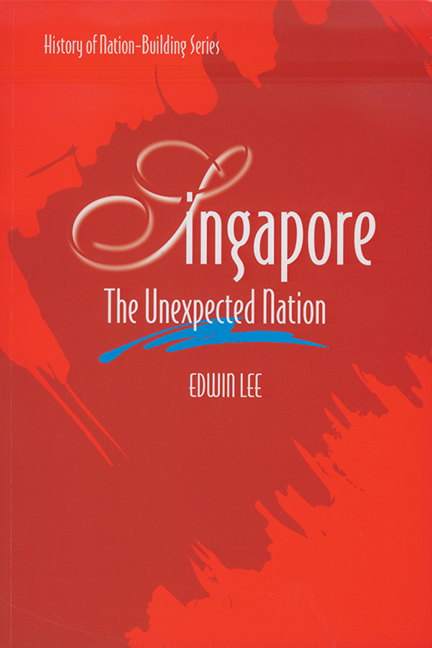Book contents
- Frontmatter
- Dedication
- Contents
- Preface
- Introduction by Wang Gungwu
- Chapter One Beginnings: From Temasek to Singapore
- Chapter Two Race, History and Nationalism
- Chapter Three Contestants and Contesting Visions
- Chapter Four The Accidental Chief Minister
- Chapter Five The Terminal Chief Minister
- Chapter Six The Embattled Prime Minister
- Chapter Seven Merger: Contesting Ownership and Principles
- Chapter Eight Terms of Disendearment
- Chapter Nine Dare to be Equal
- Chapter Ten The Way to Survive
- Chapter Eleven National Service: The Price of Independence
- Chapter Twelve Politics of Education
- Chapter Thirteen Home Ownership, National Stability and the New Middle Classes
- Chapter Fourteen University and Nation
- Chapter Fifteen Toh's Nation-Building Thrust
- Chapter Sixteen Nantah: Between Community and Nation
- Chapter Seventeen Self-Renewal: Talents for a Tough Act
- Chapter Eighteen The Consensual Prime Minister
- Chapter Nineteen Confucianism, Christianity, Chineseness
- Chapter Twenty Singapore Dreams, Singapore Dilemmas
- Chapter Twenty-One The Hyphenated Singaporean
- Chapter Twenty-Two The Unexpected Nation
- Bibliographical Note
- Index
- The Author
Chapter Twenty - Singapore Dreams, Singapore Dilemmas
Published online by Cambridge University Press: 21 October 2015
- Frontmatter
- Dedication
- Contents
- Preface
- Introduction by Wang Gungwu
- Chapter One Beginnings: From Temasek to Singapore
- Chapter Two Race, History and Nationalism
- Chapter Three Contestants and Contesting Visions
- Chapter Four The Accidental Chief Minister
- Chapter Five The Terminal Chief Minister
- Chapter Six The Embattled Prime Minister
- Chapter Seven Merger: Contesting Ownership and Principles
- Chapter Eight Terms of Disendearment
- Chapter Nine Dare to be Equal
- Chapter Ten The Way to Survive
- Chapter Eleven National Service: The Price of Independence
- Chapter Twelve Politics of Education
- Chapter Thirteen Home Ownership, National Stability and the New Middle Classes
- Chapter Fourteen University and Nation
- Chapter Fifteen Toh's Nation-Building Thrust
- Chapter Sixteen Nantah: Between Community and Nation
- Chapter Seventeen Self-Renewal: Talents for a Tough Act
- Chapter Eighteen The Consensual Prime Minister
- Chapter Nineteen Confucianism, Christianity, Chineseness
- Chapter Twenty Singapore Dreams, Singapore Dilemmas
- Chapter Twenty-One The Hyphenated Singaporean
- Chapter Twenty-Two The Unexpected Nation
- Bibliographical Note
- Index
- The Author
Summary
The Singaporean middle class aspired for the 5Cs — career, condominium, car, club, and credit card. To get them, Singaporeans focused on education and hard work. Their attitude to education was utilitarian, to give themselves the requisite qualifications which meant they must score good grades in examinations.
Their singlemindedness had paid off. It was well adapted to the kind of economic strategy that the government had been pursuing since independence. It had brought them in less than a lifetime to first-world status. But from this point on they needed to change. They should realize that there is more to education than they had so far had the inclination or time to explore. They must know that they cannot have university education without a learning and research culture, nor technology without entrepreneurship. They must start thinking imaginatively like the middle classes of the first world if they want to keep abreast of them.
The culture of the Singaporean middle class was such that they were not the prime mover of change. The government was the prime mover, and had to act like some benevolent but hard-driving latter day Moses, leading a timorous, complaining middle class into the new frontier of global competitiveness. The government launched all the new business ventures, which became established household names. It forced people to save through the CPF system, and encouraged nationwide home ownership through a public housing board, which was to bill itself as the biggest real estate office on earth.
The government was not short on visions of the future drawn up with the participation mainly of the English-educated middle class. However, it could not foresee that one of its dearest (in more than one sense) schemes, home ownership, could be in conflict with another scheme deemed crucial some twenty years downstream, the nurturing of entrepreneurship. It allowed another massive inflation in property values in the early to mid-1990s.
In July 1997, the Asian Financial Crisis struck and, in a flash, revealed to a whole region the danger of moving way out of sync with the forces of globalization. The affected countries which appealed to the International Monetary Fund had to comply with conditions about opening up their home markets and transparency issues. Although Singapore was not badly hit, the PAP Government swung into action to liberalize banking, telecommunications, educational, legal, and health care services.
- Type
- Chapter
- Information
- SingaporeThe Unexpected Nation, pp. 559 - 596Publisher: ISEAS–Yusof Ishak InstitutePrint publication year: 2008

